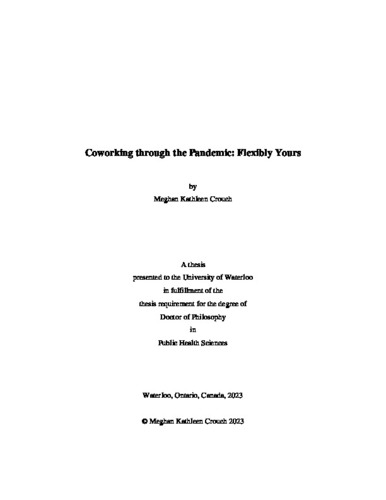| dc.description.abstract | Coworking can be defined as a paid for service (usually) providing shared workspace and amenities to users. When the pandemic hit, owing to the business model’s in-person foundations of physical proximity and shared amenities, the coworking industry was expected to be seriously impacted. Yet fast forward, and as the pandemic has played out, coworking businesses are uniquely positioned in this uncertain and changing workscape.
This dissertation presents one of the first academic explorations into how independent coworking businesses fared in the initial year of the pandemic. Specifically, the research explores the following questions:
1. How did independent coworking businesses manage and adapt to the pandemic?
2. What is virtual coworking and what are the experiences of workers in these virtual coworking spaces?
3. How does coworking flexibility affect social support and connection?
Using a critically interpretive poststructural approach, this ethnography included virtual fieldwork and interviews. Sixty hours of virtual participant observation and 30 loosely structured interviews were conducted with coworking stakeholders (i.e., owner-operators, managers, and users) over videoconferencing platforms. Secondary data included written fieldnotes and coworking documents.
Results capture the strategies used by coworking business owner-operators and managers to sustain their businesses and the attendant relationships with coworking users, irrespective of whether or not a physical location could be provided under pandemic lockdowns. Given the expansion of coworking businesses into virtual service offerings, a key contribution of my research is the finding that co-location in a physical coworking space is not necessary to cultivate vibes and a sense of community. By removing the physical infrastructure of coworking, the virtual coworking product in which I participated points to both a reinforcement of and an emphasis on the centrality of social connection, support, and community. By de-centering the priority of a physical co-location, I conceptualize coworking businesses as commodified support infrastructures—affective atmospheres produced through the entanglement of human bodies, other living things, objects, and technologies in a space.
In viewing coworking businesses as fluid affective atmospheres of support, my research adds to the emerging coworking scholarship that attends to the atmospheric qualities of coworking, the role of affective labour, and the possibilities of encounters and interactions as bodies, objects, and technologies interconnect. My results reinforce the deep ambivalence of coworking, capturing tensions between productivity and sociality, and a blurring of boundaries between professional and private, and work and leisure. The analysis also suggests that the inherent flexibility, informality, turnover, and autonomy in coworking practices can make creating stable social connections and support difficult. Finally, the COVID-19 crisis brought to light how coworking lies primarily outside the scope of current employment legislation, which includes occupational health and safety, employment standards, and workers’ compensation. In the absence of well-defined policy directions, coworking business owner-operators and managers made individualized decisions, thereby ultimately downloading further risk and responsibility onto their coworking users. | en |

